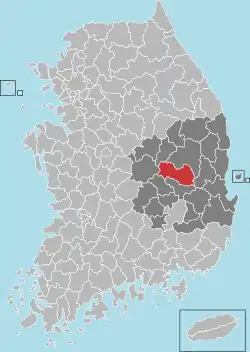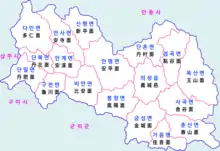Uiseong
의성군 | |
|---|---|
| Korean transcription(s) | |
| • Hangul | 의성군 |
| • Hanja | 義城郡 |
| • Revised Romanization | Uiseong-gun |
| • McCune-Reischauer | Ŭisŏng-gun |
 Flag  Emblem of Uiseong | |
 Location in South Korea | |
| Country | |
| Region | Yeongnam |
| Administrative divisions | 1 eup, 17 myeon |
| Area | |
| • Total | 1,175.89 km2 (454.01 sq mi) |
| Population (2002) | |
| • Total | 71,216 |
| • Density | 60.6/km2 (157/sq mi) |
| • Dialect | Gyeongsang |
Uiseong County (Uiseong-gun) is a county in Gyeongsangbuk-do Province, South Korea. Located near the center of the province, it is bounded by Andong on the north, Cheongsong on the east, Gunwi County on the south, and Sangju and Yecheon on the west. As in most parts of Korea, most of the land is vacant and forested; only about 19% of the county's area is farmland. The county is largely rural, with an economy dominated by agriculture; the only urbanized area is the county seat, Uiseong-eup.
South Korean national treasure 77, a five-storied stone pagoda, lies in Geumseong-myeon. Also in Geumseong-myeon are a set of more than 300 dinosaur tracks from the early Cretaceous period.[1]
Uiseong is home to Gounsa, one of the 24 head temples of the Jogye Order of Korean Buddhism. This temple is located in Danchon-myeon.
Famous people from Uiseong include Yu Seong-ryong, prime minister and one of the best loyal contributors during the Japanese invasions of Korea (1592–98), and the "Garlic Girls", women's curling silver medalists at the 2018 Winter Olympics.[2][3][4]
Administrative divisions

Uiseong County is divided into 18 primary districts (1 eup and 17 myeon). These in turn are divided into 178 legal ri, which in turn are composed of a total of 399 administrative ri. The county's primary divisions are as follows:
.png.webp)

| Name | Hangeul | Hanja |
|---|---|---|
| Uiseong-eup | 의성읍 | 義城邑 |
| Danchon-myeon | 단촌면 | 丹村面 |
| Jeomgok-myeon | 점곡면 | 點谷面 |
| Oksan-myeon | 옥산면 | 玉山面 |
| Sagok-myeon | 사곡면 | 舍谷面 |
| Chunsan-myeon | 춘산면 | 春山面 |
| Gaeum-myeon | 가음면 | 佳音面 |
| Geumseong-myeon | 금성면 | 金城面 |
| Bongyang-myeon | 봉양면 | 鳳陽面 |
| Bian-myeon | 비안면 | 比安面 |
| Gucheon-myeon | 구천면 | 龜川面 |
| Danmil-myeon | 단밀면 | 丹密面 |
| Danbuk-myeon | 단북면 | 丹北面 |
| Angye-myeon | 안계면 | 安溪面 |
| Dain-myeon | 다인면 | 多仁面 |
| Sinpyeong-myeon | 신평면 | 新平面 |
| Anpyeong-myeon | 안평면 | 安平面 |
| Ansa-myeon | 안사면 | 安寺面 |
Climate
Uiseong has a monsoon-influenced humid continental climate (Köppen: Dwa) with cold, dry winters and hot, rainy summers.
| Climate data for Uiseong (1991–2020 normals, extremes 1973–present) | |||||||||||||
|---|---|---|---|---|---|---|---|---|---|---|---|---|---|
| Month | Jan | Feb | Mar | Apr | May | Jun | Jul | Aug | Sep | Oct | Nov | Dec | Year |
| Record high °C (°F) | 15.3 (59.5) |
24.1 (75.4) |
27.2 (81.0) |
33.1 (91.6) |
36.3 (97.3) |
36.5 (97.7) |
39.9 (103.8) |
40.4 (104.7) |
35.4 (95.7) |
30.2 (86.4) |
25.4 (77.7) |
18.0 (64.4) |
40.4 (104.7) |
| Mean daily maximum °C (°F) | 4.8 (40.6) |
7.8 (46.0) |
13.4 (56.1) |
20.3 (68.5) |
25.4 (77.7) |
28.6 (83.5) |
30.5 (86.9) |
31.0 (87.8) |
26.6 (79.9) |
21.4 (70.5) |
14.0 (57.2) |
6.8 (44.2) |
19.2 (66.6) |
| Daily mean °C (°F) | −3.0 (26.6) |
−0.3 (31.5) |
5.3 (41.5) |
11.7 (53.1) |
17.1 (62.8) |
21.6 (70.9) |
24.8 (76.6) |
25.1 (77.2) |
19.8 (67.6) |
12.7 (54.9) |
5.5 (41.9) |
−1.1 (30.0) |
11.6 (52.9) |
| Mean daily minimum °C (°F) | −9.6 (14.7) |
−7.5 (18.5) |
−2.2 (28.0) |
3.3 (37.9) |
9.0 (48.2) |
15.2 (59.4) |
20.3 (68.5) |
20.5 (68.9) |
14.4 (57.9) |
6.0 (42.8) |
−1.2 (29.8) |
−7.5 (18.5) |
5.1 (41.2) |
| Record low °C (°F) | −23.3 (−9.9) |
−22.1 (−7.8) |
−12.7 (9.1) |
−8.4 (16.9) |
−1.1 (30.0) |
4.1 (39.4) |
10.7 (51.3) |
10.3 (50.5) |
2.1 (35.8) |
−7.3 (18.9) |
−13.7 (7.3) |
−19.2 (−2.6) |
−23.3 (−9.9) |
| Average precipitation mm (inches) | 15.5 (0.61) |
22.6 (0.89) |
41.5 (1.63) |
73.6 (2.90) |
78.6 (3.09) |
115.8 (4.56) |
221.4 (8.72) |
229.6 (9.04) |
124.3 (4.89) |
41.5 (1.63) |
30.5 (1.20) |
16.3 (0.64) |
1,011.2 (39.81) |
| Average precipitation days (≥ 0.1 mm) | 4.2 | 4.7 | 6.9 | 7.5 | 8.0 | 9.0 | 13.7 | 13.7 | 9.1 | 5.3 | 5.8 | 4.7 | 92.6 |
| Average snowy days | 5.2 | 3.3 | 2.0 | 0.1 | 0.0 | 0.0 | 0.0 | 0.0 | 0.0 | 0.1 | 0.8 | 3.3 | 14.7 |
| Average relative humidity (%) | 64.8 | 61.3 | 60.1 | 57.9 | 62.1 | 67.3 | 76.2 | 76.4 | 76.3 | 73.9 | 71.1 | 67.3 | 67.9 |
| Mean monthly sunshine hours | 177.9 | 180.3 | 202.2 | 212.5 | 234.6 | 191.3 | 155.0 | 160.8 | 149.8 | 178.7 | 160.2 | 171.0 | 2,174.3 |
| Percent possible sunshine | 57.4 | 58.0 | 54.1 | 56.5 | 53.9 | 46.0 | 36.3 | 41.7 | 42.8 | 53.6 | 52.8 | 56.2 | 50.1 |
| Source: Korea Meteorological Administration (snow and percent sunshine 1981–2010)[5][6][7] | |||||||||||||
Festival
Uiseong Sansuyu Festival
Hwajeon-ri, a 15-minute walk from Uiseong Town, is a spectacular place with Sansuyu. Starting from late March, yellow flowers will bloom and bloom until mid-April, and in October, red fruit will be produced and dyed red. The Hwajeon-ri area consists of more than 30,000 trees that have grown up since the Chosun Dynasty.[8]
Twin towns – sister cities
Uiseong is twinned with:
See also
References
- ↑ "Uiseong Dinosaur Tracks - North Gyeongsang Province - South Korea".
- ↑ "Sweden Wins Gold, South Korea's 'Garlic Girls' Win Silver Medal In Curling". NPR.org. Retrieved 2018-02-25.
- ↑ "Winter Olympics: Nine unlikely stars of Pyeongchang 2018". BBC Sport. 2018-02-25. Retrieved 2018-02-25.
- ↑ Wee, Sui-Lee; Young, Jin Yu (2022-02-09). "How the 'Garlic Girls' Overcame Abuse to Return to the Olympics". The New York Times. ISSN 0362-4331. Retrieved 2022-02-09.
- ↑ "Climatological Normals of Korea (1991 ~ 2020)" (PDF) (in Korean). Korea Meteorological Administration. Archived from the original (PDF) on 29 January 2022. Retrieved 4 April 2022.
- ↑ 순위값 - 구역별조회 (in Korean). Korea Meteorological Administration. Retrieved 4 April 2022.
- ↑ "Climatological Normals of Korea" (PDF). Korea Meteorological Administration. 2011. Archived from the original (PDF) on 7 December 2016. Retrieved 8 December 2016.
- ↑ "의성산수유꽃피는마을&의성산수유꽃축제". ussansuyu.kr. Retrieved 2018-04-21.
